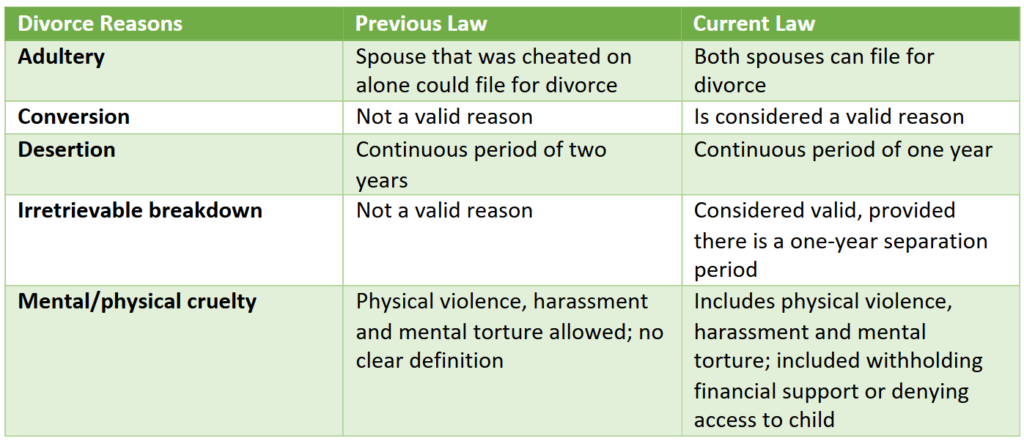
Divorce Act India. Created using Canva
An Overview of the Existing Divorce Laws in India
In India, divorce is allowed for a bunch of reasons like adultery, cruelty, desertion, conversion, mental disorder, venereal disease, and when the marriage just cannot be saved. The district court where the couple last lived together handles the divorce case. One of the spouses must have lived in India for at least six months before filing for divorce. There is a mandatory six-month waiting period after filing, during which the court might try to reconcile the couple. The couple can try to reach a separation agreement, which the court will review and approve. The court might also suggest mediation to resolve disputes and reach a settlement.
Divorce can be contested or uncontested. In a contested divorce, the court holds a trial and decides on the terms. In an uncontested divorce, the couple agrees on all terms, and the court just approves the agreement. The court might order one spouse to pay alimony to the other, based on factors like the duration of the marriage, each spouse’s earning capacity, and their standard of living during the marriage. The court will also decide on child custody and support based on the child’s best interests, with both parents having a legal obligation to provide financial support. If either spouse is unhappy with the district court’s decision, they can appeal to a higher court.
For more information on the current trends and statistics on divorce in India, read our blog on the same here.
Changes in the Divorce Act
In the last year, Courts have made changes to existing divorce rules in India. The main changes are given in the table below:

Specific Changes Made to the Divorce Act in India in the Past Year
Waiving the Mandatory 6-Month Period for Rehabilitation According to Section 13B (2)
When couples approach the court for divorce with mutual consent, the court grants them a mandatory six-month period to reconsider their decision. This period is intended to save the marriage. After six months, the couple may decide to reunite or proceed with the divorce. However, under the new rule, it is no longer compulsory and is left to the court’s discretion. The court may decide, based on the facts and circumstances of the specific case, whether there is a need to order a six-month rehabilitation period or if the couple should be allowed to divorce immediately.
This was observed in the Supreme Court ruling in the Akanksha vs Anupam Mathur case (and in a few other cases). The Court was satisfied that the couple had made a conscious decision to divorce, and there was no point in requiring them to wait another six months. The Court decided to waive the six months and ordered the dissolution of the marriage.
Irretrievable Breakdown of Marriage, a Valid Ground for Divorce
When a couple decides that they cannot continue living as married partners, this situation is called separation or breakdown of the marriage. The partners may or may not live under the same roof, but they do not live as husband and wife. There were no separate rules for this issue in Indian divorce law. It is at the court’s discretion whether the separation can form the ground for divorce. If the court believes there is no possibility of the couple reuniting, or if either or both spouses are unwilling to live with each other, it can allow them to proceed with the divorce.
In the Sangamitra Ghose vs. Kajal Kumar Ghosh case, the Supreme Court observed that the marriage between the parties was irretrievably broken down and that there was no possibility of repairing the bond of the marriage. The apex court, therefore, ordered that the couple divorce on the grounds of the irretrievable breakdown of the marriage.
Adultery Not Punishable Under the New Divorce Rules
Adultery is not punishable under the new divorce rules. Adultery can be a reason for divorce in India, but it is not punishable. The court noted that punishing the spouse and their lover for adultery is not a solution to save the marriage. Couples can file for divorce on the grounds of adultery, but there is no punishment for it.
Law of Maintenance Extended to Live-in Relationships
Under the Hindu Marriage Act of 1955, the court can order maintenance payments to help women maintain the same standard of living after divorce. If the marriage is not under Hindu Law, women can claim maintenance under Section 125 of the Criminal Procedure Code. Live-in relationships are treated like marriages. So, a woman in a live-in relationship can also claim maintenance from her partner under the Criminal Procedure Code. If the couple has been in a live-in relationship for a long time, there is no need to provide strict proof of marriage.
According to the new divorce rules in India, the victim, whether the wife or the live-in partner, can claim relief under the Protection of Women from Domestic Violence Act, 2005, even if she is not eligible for a claim under the Criminal Procedure Code. The victim can claim even higher relief under the Protection of Women from Domestic Violence Act than what is provided under the Criminal Procedure Code.
Triple Talaq Cannot Be a Ground for Divorce
Under Muslim Law, just saying ‘Talaq’ three times used to be enough for a divorce in India. This practice allowed Muslim men to unilaterally end the marriage. The arbitrary practice of triple talaq was perceived to be against women’s rights. Now, ‘Triple Talaq’ has been declared unconstitutional and has no significance in the eyes of the law under the new divorce rules in India.
Divorce Under Personal Law Cannot Override the Power of the Civil Court
Divorce can only be ordered by the Civil Court. If the Christian Church or any other personal law grants the divorce, it will be invalid. The Apex Court in the Molly Joseph vs George Sebastian case held that only the competent court can dissolve a marriage. The order or decree of the Civil Court will prevail and override any order passed by personal law or Ecclesiastical Tribunal (religious order).
Conclusion
In 2024, India’s Divorce Act had undergone changes to modernise and streamline divorce proceedings. Crucial updates include the recognition of irretrievable breakdown as a valid ground for divorce, the waiver of the mandatory six-month reconciliation period in mutual consent cases, and the decriminalisation of adultery. Additionally, live-in partners can now claim maintenance, and the unconstitutional practice of triple talaq has been abolished. These reforms aim to provide more equitable and efficient resolutions. They ensure that divorce laws align with contemporary societal needs while safeguarding the rights of all parties involved, particularly women. The judiciary continues to play a pivotal role in interpreting and enforcing these evolving laws.
For pointers on handling divorce and rebuilding your life post-divorce, join the Rematch app.
References
“New Divorce Rules in India: Latest Regulations.” Vakilsearch Blog. Accessed 31 January 2025. https://vakilsearch.com/blog/new-divorce-rules-in-india-latest-regulations/.
“New Rules for Divorce in India 2024: A Comprehensive Guide.” Legalkart Legal Blog. Accessed 31 January 2025. https://www.legalkart.com/legal-blog/new-rules-for-divorce-in-india-2024-a-comprehensive-guide.

